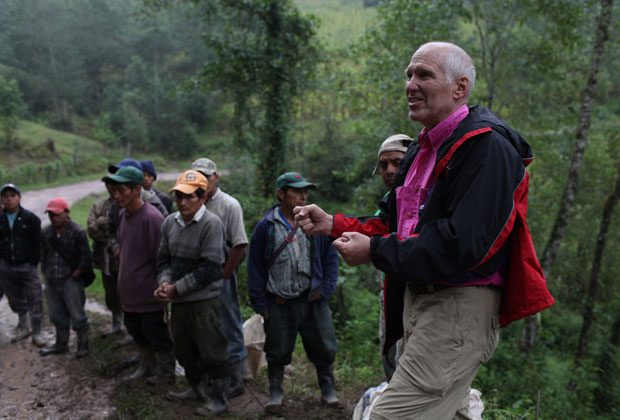The water connection

by Carol Anne Winchester
Furman business professor Bruce Clemens is passionate about Guatemala. After living there for ten years, he has dedicated his expertise in economic development and sustainability to help the country begin to heal from civil war, social injustice, and poverty.
One key, according to Clemens, is water.
Currently 884 million people worldwide lack access to safe drinking water and 2.6 billion people are without basic sanitation services (United Nations, 2010). This situation particularly impacts children and has contributed to the deaths of 1.6 million children, under the age of five, each year (WHO, 2006).* In a typical village without a potable water system, women carry water approximately one mile to obtain water. They do so several times a day.
Forty years ago, Clemens (and an international team of volunteer engineers, architects and social scientists) founded Agua del Pueblo, an organization that works with Guatemalan communities to design potable water systems which can be maintained by residents without the help of government or other organizations.
The gift of clean, accessible water and improved sanitation has far-reaching effects on community infrastructure by improving public health, promoting economic development, and ultimately empowering the community. Agua del Pueblo has brought water to more than 20% of the country’s rural population.
Students in Clemens’s three-week Furman May Experience program “Sustainability in Guatemala” worked with Agua del Pueblo to map a new potable water pipeline for Chanán, the saddle between volcanoes Tolimán and Atitlan. Once the pipeline is complete, this land, which was once uninhabitable, could be the home for thousands.
Inspired by this work, Furman’s Global Issues Forum, a student-led initiative, adopted “Global Water Challenges” as the 2011–12 campus theme. Working with the Shi Center for Sustainability, and a committee of staff and faculty, students secured a challenge grant from the Duke Endowment. A campus “Water Walk” raised awareness about the countless miles and hours impoverished peoples spend carrying water. Combined with the Duke grant, the Global Issues Forum raised enough money to fund a significant portion of a complete water system for the remote Guatemalan village of Esperanza San Antonio.
In May, Clemens visited the site, which from Guatemala City, is a six-hour drive on an asphalt road, followed by an eight-hour drive on rough dirt roads, followed by a one-hour hike. He collected topographic, economic, and health data for the project and met with village leaders, representatives from the mayor’s office from the municipality of Santa Cruz de Barillas, and Agua del Pueblo representatives to establish the responsibilities of each organization.
Agua del Pueblo, with funding from Furman and the Duke Endowment, will coordinate the supplies and engineering for a totally new water system, but the community must provide the labor. The municipality and the village will work together to bring clean water and new opportunities to the people of Esperanza.
And Furman will be there to see the transformation. Clemens and earth and environmental sciences professor Bill Ranson plan to accompany students for May X 2013 Global Sustainability in Guatemala. Students will have the opportunity to work alongside the people of Esperanza San Antonio as they complete their new water system. The students will also collect baseline data on the health and economics of the village to continue Furman’s studies on the relationships between investments in sustainability, health, and economics.
Students Michael Sauer and Stuart Smith who traveled to Guatemala with Clemens in 2011 have co-authored a paper in its final revision at the Journal of International Development.
Read more about the first May Experience Guatemala trip here: http://fuguatemala2011.blogspot.com/.
*United Nations. 2010. High-level plenary meeting of the general assembly. Millennium development goals. New York, NY. World Health Organization (WHO). 2006. Meeting the MDG drinking water and sanitation target: the urban and rural challenge of the decade. Geneva: WHO. Retrieved from http://www.who.int/water_sanitation_health/monitoring/jmpfinal.pdf